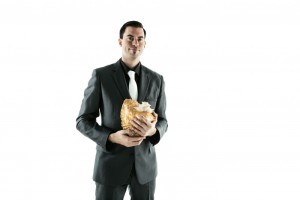When Victoria’s Nick La Riviere started to put together the material for Another Time Around, his second studio album, he knew that there was going to be one major change: the album was going to have vocals on it. His debut, 2009’s Too Much to Do, was completely instrumental, but the music dictated singing this time around.
“The singing went hand in hand with the genres of music on this album,” explains La Riviere. “It made sense to do an all-instrumental album for my previous jazz record, but for this album I wanted to branch out into other genres. I’ve had the opportunity to play a lot of different styles of music with the various bands I work with, and I wanted my own band to reflect that musical diversity as well.”

One of the most unique aspects of La Riviere’s music is his tendency to play conch shells. He says he first discovered conch shells as an instrument through Steve Turre, the trombonist in the Saturday Night Live band.
“It’s a pretty unique-sounding instrument, and in [Turre’s] groups they can sound almost like a choir of human voices,” he says. “The transition from trombone to conch shells is pretty natural: you do basically the same thing with your mouth to make the sound, so when I had an opportunity to try playing one it was an easy decision to keep up with it. It’s great being able to do something at a show that many people have never seen before.”
The long road to conch shells began at the Victoria Conservatory of Music, which is a Camosun satellite campus. La Riviere studied there in the jazz program; he says it’s important for students to support local creativity.
“I’ve played in all kinds of bands, and one of the things I always really enjoy is playing in a band that’s performing its own original music,” he says. “It’s great to work with people who are actually creating something of their own, which is what I’ve tried to do here. I hope the students can support that. Of course I don’t want them to listen to my album only because it’s local; hopefully the quality of the music and recording production also makes it something that can just be enjoyed for what it is.”
And when he’s not creating his music, La Riviere is teaching two large community bands: one that plays big band music and one that is R&B. He says that the two are totally different from each other, but both are a lot of fun.
“There’s a lot of satisfaction watching as those groups go from just receiving their music for the season to really playing it well and rocking it. Creating music for me is more of a personal experience. I haven’t done a lot of group writing, so most of my music starts with just me at the piano trying to work out my ideas, whereas teaching the large bands is a lot more of a group effort to make something work.”
